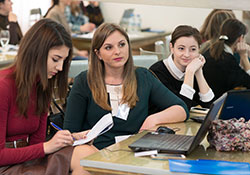Writing and reporting health news: training for journalists from Tiraspol

WHO
On 24–25 March 2016, the WHO Country Office in the Republic of Moldova and a team of international media experts from Bulgaria and the United Kingdom led a 2-day training on writing and reporting health news for journalists from Tiraspol.
The training was attended by journalists from various media outlets, and emphasized reporting and writing skills including accuracy, impartiality, speed, clarity and structure. Tatiana Skrypnik, head of the health authority from Tiraspol, mentioned in her opening speech WHO's support in organizing the training programme for local journalists, highlighting the crucial role of journalists in informing on topics related to health and health systems.
The training had an interactive format and helped journalists to:
- recognize good practices;
- revise principles of citation, and work with figures and statistics;
- decipher and avoid medical terminology; and
- apply recent media techniques during online exercises, under the mentoring of trainers who helped and guided them with their stories.
Training also covered sourcing and ethics.
NCD prevention and mass media: hand-in-hand
One of the training modules reflected the burden of noncommunicable diseases (NCDs) on modern health systems and the risk factors of NCDs such as tobacco consumption and harmful use of alcohol. Reporting on NCDs involves an understanding of the benefits to public health and people. In this context, journalists were equipped with information to build and substantiate news on a range of NCD-related issues, to promote healthy life styles and to change the health behaviours of populations.
Journalists expressed their willingness to receive additional training and wished to extend the training programme by an additional 1–3 days.
WHO support for this activity is envisioned in the biennial collaborative agreement 2016–2017 between the Moldovan Ministry of Health and WHO/Europe. The initiative is financially supported by WHO and the Support to Confidence Building Measures Programme of the European Union and coordinated by WHO, under technical assistance and capacity-building activities in the health sector.



